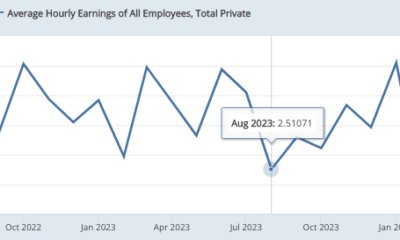Finance
The economics of activism – Econlib

There are two different ways you could use economics to analyze political activism. (Well, more than two, but in this post I’ll only talk about two of them.) First, what do I mean when I talk about political activism? I mean things like attending rallies or protests, signing petitions, voting in elections, frequently advocating and trying to convince people of a certain point of view or in favor of a certain type of political policy, things of that nature.
One way to think about activism is to see it as a form of production. In this model, the activist engages in activism to produce a certain output. For example, activists with complaints about the justice system protest on the streets, sign petitions, vote and put forward arguments in an attempt to create a better justice system. Environmentalists engage in these activities to achieve better environmental health, however one may define that, and so on. When we see it as a form of production, we can say that activism seeks to ensure or improve the production of public goods. For example, in the environmental case, improved air quality would be a public good; it is non-rivalrous and non-excludable.
The second way to see activism is not as a form of production, but as a form of consumption. What does it mean to be a consumer of activism? It means that the activist engages in activism to enjoy certain private benefits. These benefits include things like a sense of community and connection with fellow activists, gaining social status, and a sense of purpose and meaning. While activism as production is concerned with the production of public goods, activism as consumption is about the acquisition of private goods. When practiced as a form of consumption, the broader outcomes of activism are externalities.
Like education can be both a form of human capital accumulation and a form of social signaling, while activism can be both a form of production and a form of consumption. Each activist can be motivated by either, or both, to varying degrees. But each form of activism has very different implications for what we should expect.
When activism is seen as a form of production, we expect the activist to be deeply informed about the subject: environmental science, criminal justice, or whatever it may be. They would have well-defined end goals – a clear point at which you could say “mission accomplished” and upon completion of that mission the activism would cease. The activist would keep a close eye on how their activities are moving things closer to or away from the desired goal. This would motivate the activist to self-examine and course correct if an approach seems ineffective or counterproductive.
When activism is practiced as a form of consumption, none of the above conditions may apply. Because the activist seeks personal psychological and emotional satisfaction as well as social appreciation, there is no particular need to be deeply informed about the subject. We would expect people to both passionately protest an issue while simultaneously being unable to answer even the most basic questions about that same issue. Nor will the activist be able to clearly identify and define what the desired outcome is, and how they will know it has been achieved, in anything other than the vaguest and most indefinable of ways. Instead of saying “mission accomplished” at any point, the activist continually moved the goal post. How effectively the activism achieves its stated goals will also not be scrutinized by the activist, nor will new approaches be taken if a particular form of activism appears to be ineffective or actively counterproductive. Instead of focusing on the issues that are most pressing and using methods that are most effective, the activist will be motivated by the issues that are trendiest, or make him feel the best. Their activism will focus on activities that send the strongest signal and increase their social status, rather than on what effectively achieves the stated goal.
Activism as production has a number of features that make it potentially socially beneficial in a way that activism as consumption lacks. The course-correction methods we would expect in the production of activism will of course be imperfect, but they will at least tend to tilt the movement in a direction that leads to the production or improvement of some public good. But activism like consumption lacks these mechanisms, so it is purely coincidental that the externalities of this consumption will be positive rather than negative. And there is a greater chance that the externalities will be negative – there are more ways to make things worse than there are to make things better, so it is much more likely that activities that lack evaluation and correction methods will do more harm than good doing.
It seems to me that the vast majority of political activism today consists of the consumption of a private good with high negative externalities, with relatively few productive activities that actually contribute to the creation or improvement of some public good. Those who treat activism and political engagement as a consumer good can best be described by a play from TS Eliot The Cocktail Party:
Half of the damage done in this world is due to people wanting to feel important. They don’t mean to cause harm, but they don’t care about the harm. Either they don’t see it, or they justify it because they are lost in the endless struggle to think well of themselves.













